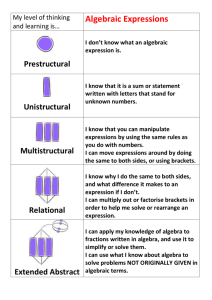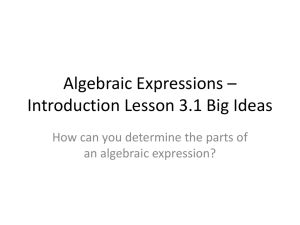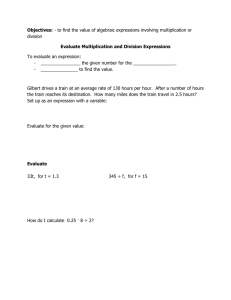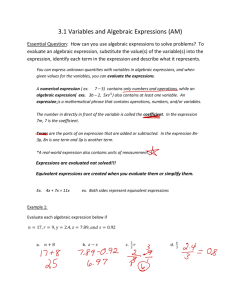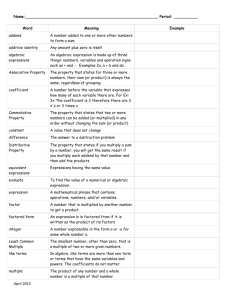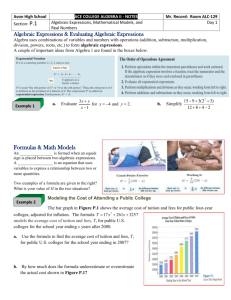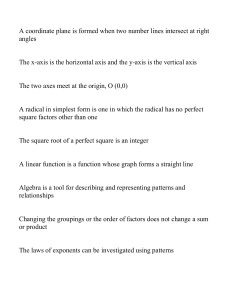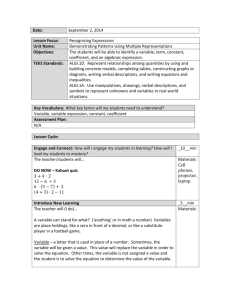Year-9-Curriculum-Overview-Autumn-Half-Term-2
advertisement
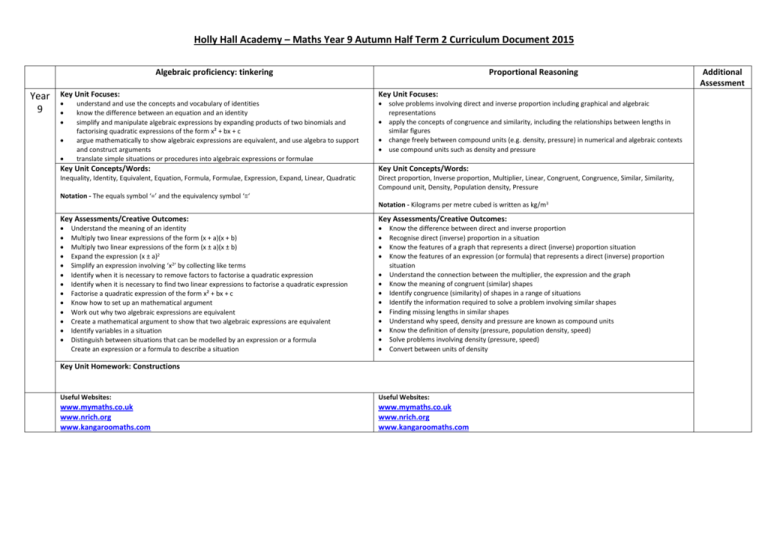
Holly Hall Academy – Maths Year 9 Autumn Half Term 2 Curriculum Document 2015 Algebraic proficiency: tinkering Year 9 Proportional Reasoning Key Unit Focuses: Key Unit Focuses: solve problems involving direct and inverse proportion including graphical and algebraic representations apply the concepts of congruence and similarity, including the relationships between lengths in similar figures change freely between compound units (e.g. density, pressure) in numerical and algebraic contexts use compound units such as density and pressure understand and use the concepts and vocabulary of identities know the difference between an equation and an identity simplify and manipulate algebraic expressions by expanding products of two binomials and factorising quadratic expressions of the form x² + bx + c argue mathematically to show algebraic expressions are equivalent, and use algebra to support and construct arguments translate simple situations or procedures into algebraic expressions or formulae Key Unit Concepts/Words: Key Unit Concepts/Words: Inequality, Identity, Equivalent, Equation, Formula, Formulae, Expression, Expand, Linear, Quadratic Direct proportion, Inverse proportion, Multiplier, Linear, Congruent, Congruence, Similar, Similarity, Compound unit, Density, Population density, Pressure Notation - The equals symbol ‘=’ and the equivalency symbol ‘≡‘ Notation - Kilograms per metre cubed is written as kg/m3 Key Assessments/Creative Outcomes: Understand the meaning of an identity Multiply two linear expressions of the form (x + a)(x + b) Multiply two linear expressions of the form (x ± a)(x ± b) Expand the expression (x ± a)2 Simplify an expression involving ‘x2’ by collecting like terms Identify when it is necessary to remove factors to factorise a quadratic expression Identify when it is necessary to find two linear expressions to factorise a quadratic expression Factorise a quadratic expression of the form x² + bx + c Know how to set up an mathematical argument Work out why two algebraic expressions are equivalent Create a mathematical argument to show that two algebraic expressions are equivalent Identify variables in a situation Distinguish between situations that can be modelled by an expression or a formula Create an expression or a formula to describe a situation Key Assessments/Creative Outcomes: Know the difference between direct and inverse proportion Recognise direct (inverse) proportion in a situation Know the features of a graph that represents a direct (inverse) proportion situation Know the features of an expression (or formula) that represents a direct (inverse) proportion situation Understand the connection between the multiplier, the expression and the graph Know the meaning of congruent (similar) shapes Identify congruence (similarity) of shapes in a range of situations Identify the information required to solve a problem involving similar shapes Finding missing lengths in similar shapes Understand why speed, density and pressure are known as compound units Know the definition of density (pressure, population density, speed) Solve problems involving density (pressure, speed) Convert between units of density Key Unit Homework: Constructions Useful Websites: Useful Websites: www.mymaths.co.uk www.nrich.org www.kangaroomaths.com www.mymaths.co.uk www.nrich.org www.kangaroomaths.com Additional Assessment
